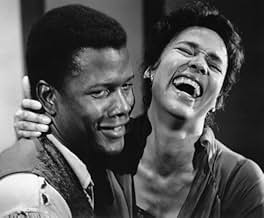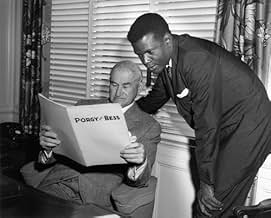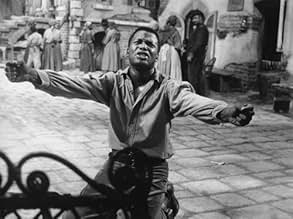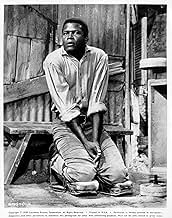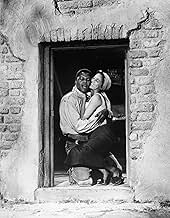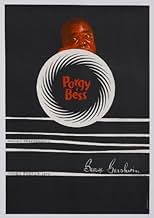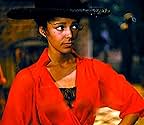IMDb-BEWERTUNG
6,9/10
2041
IHRE BEWERTUNG
Füge eine Handlung in deiner Sprache hinzuA woman whose past is scorned by nearly everyone around her meets a man who'd love her regardlessly - if only everyone else would allow them to.A woman whose past is scorned by nearly everyone around her meets a man who'd love her regardlessly - if only everyone else would allow them to.A woman whose past is scorned by nearly everyone around her meets a man who'd love her regardlessly - if only everyone else would allow them to.
- 1 Oscar gewonnen
- 4 Gewinne & 10 Nominierungen insgesamt
Empfohlene Bewertungen
I first saw the opening of Otto Preminger's "Porgy and Bess" on TV, probably some time in the early 80s, and my younger self found it a bit slow, despite the timeless music. I turned it off
Last night, an extremely rare, cobbled together print screened at the L.A. Cinematheque and it was a bit of a revelation. The performances are strong and memorable. Dorothy Dandridge brings a great deal of vulnerability, strength and subtle (at least by today's standards) eroticism to her part. Sidney Poitier is said to be uncomfortable with the movie, but his performance is terrific, as is Pearl Bailey. Even better are Sammy Davis as the amoral, cat-like Sportin' Life and Brock Peters as the villanious bully Crown.
Still, I'm no fan of Preminger's earlier, leaden -- and far easier to see -- "Carmen Jones." Porgy and Bess" is far superior to that less controversial film -- though that may have to do with the fact that the source material is also far superior.
As seen last night, this is a sturdy but far from perfect work. Not all of the moments quite come alive, and there is some awkwardness in the way the film mixes the overtly stylized Catfish Row set (beautifully done by Oliver Smith) with actual locations. Also, even to my rather untrained ear, some brief portions of the score seem unduly popularized.
Moreover, while this doesn't detract from the achievement of the filmmakers -- Preminger's decision to film almost entirely in wide shots, with no close-ups and occasional medium shots, no doubt rendered it unwatchable on TV "panned and scanned" and may doom it even on widescreen DVDs if it gets the restoration it deserves. On smaller screens, we won't be able to make out the many details that are crucial to the way Preminger staged the film.
Also, the mix heard last night was odd. Many of the vocals, particularly on the opening "Summertime" seemed unduly soft and were overwhelmed by the instrumental music. Perhaps this can be fixed in a restoration.
There is the issue of the film's racial politics. Personally, I see nothing wrong with it, at least in a contemporary context. At the time when so few films depicted strong African-American characters, this may have seemed an unfortunate choice for a big-budget Hollywood film. And, while there may not be much "empowering" here, these are recognizable human beings that are not racial stereotypes. These are operatic characters who make poor choices because that's what tragic characters do. That alone made it a giant stride forward at the time.
In a modern context where strong and heroic African-American characters are less rare (though still not common enough), these characters seem nothing more nor less than human. They truly could be poor and undereducated people of any ethnic background.
Thorny politics aside, the original work is undoubtedly one of the truly great achievements of American music and (secondarily) theater. Poitier, Davis, Dandridge, Peters and, yes Pearl Bailey, were all amazing performers who we'll never see the likes of again. This less than perfect but still solid film clearly deserves to be seen and treasured.
Last night, an extremely rare, cobbled together print screened at the L.A. Cinematheque and it was a bit of a revelation. The performances are strong and memorable. Dorothy Dandridge brings a great deal of vulnerability, strength and subtle (at least by today's standards) eroticism to her part. Sidney Poitier is said to be uncomfortable with the movie, but his performance is terrific, as is Pearl Bailey. Even better are Sammy Davis as the amoral, cat-like Sportin' Life and Brock Peters as the villanious bully Crown.
Still, I'm no fan of Preminger's earlier, leaden -- and far easier to see -- "Carmen Jones." Porgy and Bess" is far superior to that less controversial film -- though that may have to do with the fact that the source material is also far superior.
As seen last night, this is a sturdy but far from perfect work. Not all of the moments quite come alive, and there is some awkwardness in the way the film mixes the overtly stylized Catfish Row set (beautifully done by Oliver Smith) with actual locations. Also, even to my rather untrained ear, some brief portions of the score seem unduly popularized.
Moreover, while this doesn't detract from the achievement of the filmmakers -- Preminger's decision to film almost entirely in wide shots, with no close-ups and occasional medium shots, no doubt rendered it unwatchable on TV "panned and scanned" and may doom it even on widescreen DVDs if it gets the restoration it deserves. On smaller screens, we won't be able to make out the many details that are crucial to the way Preminger staged the film.
Also, the mix heard last night was odd. Many of the vocals, particularly on the opening "Summertime" seemed unduly soft and were overwhelmed by the instrumental music. Perhaps this can be fixed in a restoration.
There is the issue of the film's racial politics. Personally, I see nothing wrong with it, at least in a contemporary context. At the time when so few films depicted strong African-American characters, this may have seemed an unfortunate choice for a big-budget Hollywood film. And, while there may not be much "empowering" here, these are recognizable human beings that are not racial stereotypes. These are operatic characters who make poor choices because that's what tragic characters do. That alone made it a giant stride forward at the time.
In a modern context where strong and heroic African-American characters are less rare (though still not common enough), these characters seem nothing more nor less than human. They truly could be poor and undereducated people of any ethnic background.
Thorny politics aside, the original work is undoubtedly one of the truly great achievements of American music and (secondarily) theater. Poitier, Davis, Dandridge, Peters and, yes Pearl Bailey, were all amazing performers who we'll never see the likes of again. This less than perfect but still solid film clearly deserves to be seen and treasured.
10olddiscs
I was @ 13 yrs of age when I saw this greatly underappreciated film at The ADAMS theatre in Newark, NJ, I purchased the Program, and later bought the soundtrack... still have both.... I am now 55 + yrs.. and have not seen it since (possibly once on network TV, in 1960's???) One of the greatest casts ever assembled, great score and production , please let another generation see this great film... It was my introduction to opera, and aided with my understanding of Tolerance.. Please family of Gerswhins or Premingers, release this classic soon !!
"Porgy and Bess" is an outstanding production of George Gershwin's masterpiece. It is tastefully done in muted colors. The voices are outstanding. Although Sidney Portier's voice is dubbed for his singing portion, he gives a very touching performance. There is a remarkable performance by Sammy Davis Jr. as Sportin Life. There is yet no DVD available for viewing, and this piece begs for one. All intelligent movie goers who enjoyed it in 1959 will appreciate the release of this masterpiece on the new medium. The screen is filled with a dynamic presentation that rivals all other musicals including the outstanding ones by Rodgers and Hammerstein. Be sure to ask for it an your video supplier. Like "Songs of the South" by Walt Disney, it may be the assumption of racial overtones that is preventing the marketing of this cinema.
I had the privilege recently of viewing what is said to be the last 35mm, Technicolor, stereo print and found it much livelier and more touching than remembered. Also closer to the original material -- basically, all screenwriter N. Richard Nash did was trim, change much recitative to spoken dialog, and insert a transitional scene or two (including a very amusing one for Pearl Bailey). Oliver Smith's production design is stagy in the "Li'l Abner"-"Guys and Dolls" '50s adaptation mode, but it works well for this work's folkloric, unrealistic quality. Stereotyping and racism are present, but not to a wince-inducing degree. Further, for a movie of its time, it's pretty frank -- the adultery, violent behavior, drug use, and self-destructive habits of the denizens of Catfish Row are not at all minimized in the telling. But there are debits, beginning with all that variation from the stage text. The loss of so much compromises Gershwin's brilliance -- no wonder the family doesn't like it. The reorchestration, especially of Sammy Davis Jr.'s material, is disconcertingly trendy and vulgar. George knew what he was doing, folks; you didn't have to mess with it so much. And while Poitier and Dandridge act well and their singing doubles sing well, there's a huge chasm between the characters' singing and speaking voices -- you're constantly aware of the artifice. What really counts here, of course, is the music, among the greatest ever written for the theater, anywhere. Despite all the tinkering, it survives,and you'd have to be made of stone not to be moved by it. If the treatment isn't entirely to the estate's liking (and it shouldn't be), there's still no reason not to spend some bucks to restore this ambitious filming of Gershwin's masterpiece and make new generations more aware of his genius.
This was/is an incredible movie, with incredible cast, music, singing, story, etc. It is a tragedy that some arrogant families (the Gerswhins or Premingers) can keep it from being available to generation after generation. I have wanted to see it again all of my life. I just found this site and read why it has not been available. Shame on these families for their pettiness. My wife is from Germany and she has never seen the movie. Neither have my step-children or my grandchildren. It is very sad that a movie of this depth and quality is not available for them to see. Where do these families get off making such a conceited, self-important, egotistical, condescending decision to prohibit generations from enjoying this film, these stars, these performances, this music! Release the video and let them world judge and enjoy!
Wusstest du schon
- WissenswertesSidney Poitier's singing voice was dubbed by opera singer Robert McFerrin (father of pop singer, classical conductor, and composer Bobby McFerrin).
- Alternative VersionenAlthough this film has never been officially released on any home media format, numerous bootleg copies, running 115 minutes, are available on VHS and DVD-R. The full-length original version runs 138 minutes, not including overture and entr'acte music.
- VerbindungenFeatured in Biography: Dorothy Dandridge: Little Girl Lost (1999)
- SoundtracksSummertime
Music by George Gershwin
Lyrics by DuBose Heyward
Sung by Loulie Jean Norman and Women's Chorus
Top-Auswahl
Melde dich zum Bewerten an und greife auf die Watchlist für personalisierte Empfehlungen zu.
- How long is Porgy and Bess?Powered by Alexa
Details
- Erscheinungsdatum
- Herkunftsland
- Sprache
- Auch bekannt als
- Porgy and Bess
- Drehorte
- Stockton, Kalifornien, USA(Venice Island - picnic sequence)
- Produktionsfirma
- Weitere beteiligte Unternehmen bei IMDbPro anzeigen
Box Office
- Budget
- 7.000.000 $ (geschätzt)
- Laufzeit
- 2 Std. 18 Min.(138 min)
Zu dieser Seite beitragen
Bearbeitung vorschlagen oder fehlenden Inhalt hinzufügen

